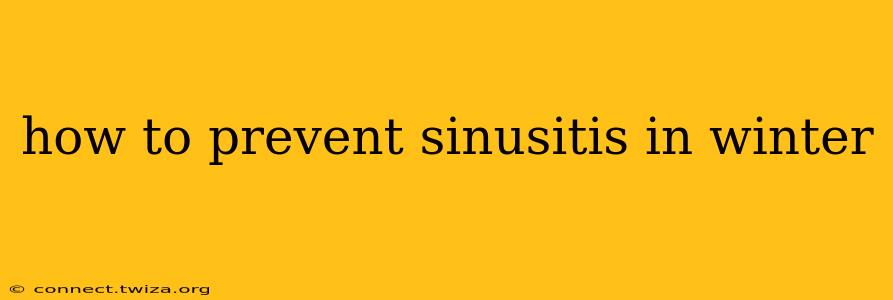Winter's cold, dry air and increased exposure to viruses create the perfect breeding ground for sinusitis. This uncomfortable condition, marked by inflammation of the sinuses, can leave you feeling miserable. But proactive measures can significantly reduce your risk. This comprehensive guide explores effective strategies to prevent sinusitis during the winter months.
What is Sinusitis, and Why is Winter a Risk Factor?
Sinusitis is the inflammation of the sinuses, air-filled cavities behind your cheekbones, forehead, and between your eyes. This inflammation can be caused by viral, bacterial, or fungal infections, or by allergies. Winter presents several factors that increase susceptibility:
- Dry Air: Cold, dry air irritates the nasal passages, making them more vulnerable to infection. The mucus membranes become dry and less effective at trapping pathogens.
- Viral Infections: The cold and flu season peaks during winter, and these viral infections are a major cause of sinusitis. Viruses weaken the immune system, making you more susceptible to secondary bacterial infections in the sinuses.
- Indoor Environments: We spend more time indoors during winter, increasing exposure to irritants like dust mites, pet dander, and mold, all potential triggers for sinusitis.
How Can I Boost My Immune System to Prevent Sinusitis?
A strong immune system is your first line of defense against sinusitis. Here's how to bolster yours:
- Prioritize Sleep: Aim for 7-9 hours of quality sleep each night. Sleep deprivation weakens the immune system.
- Eat a Healthy Diet: Focus on nutrient-rich foods, including fruits, vegetables, and whole grains. These provide essential vitamins and minerals crucial for immune function. Consider adding foods rich in Vitamin C and Zinc.
- Manage Stress: Chronic stress weakens the immune system. Practice stress-reducing techniques like yoga, meditation, or deep breathing exercises.
- Regular Exercise: Moderate exercise strengthens the immune system and improves overall health.
What are Some Lifestyle Changes to Prevent Sinusitis?
Beyond immune support, lifestyle adjustments can significantly minimize your risk:
- Stay Hydrated: Drinking plenty of water thins mucus, making it easier to drain from the sinuses.
- Use a Humidifier: A humidifier adds moisture to the air, preventing dry nasal passages. Keep the humidity level between 45-55%.
- Avoid Irritants: Minimize exposure to smoke, dust, and other airborne irritants.
- Wash Your Hands Frequently: This simple act prevents the spread of viruses and bacteria.
- Avoid Touching Your Face: Germs can easily enter your sinuses through your eyes, nose, and mouth.
What are Home Remedies to Help Prevent Sinusitis?
Several home remedies can support sinus health and potentially prevent infections:
- Saline Nasal Rinse: A saline rinse helps to clear nasal passages of irritants and mucus. Follow instructions carefully when using a neti pot or saline spray.
- Warm Compresses: Applying warm compresses to your forehead and sinuses can provide relief from sinus pressure and pain.
- Steam Inhalation: Inhaling steam can help to loosen mucus. Add essential oils like eucalyptus or peppermint for added benefits, but always exercise caution when using essential oils.
Are There Specific Foods That Can Help Prevent Sinusitis?
While no single food can prevent sinusitis, a diet rich in certain nutrients can support overall health and reduce susceptibility:
- Foods Rich in Vitamin C: Vitamin C is a powerful antioxidant that supports immune function. Citrus fruits, berries, and leafy green vegetables are good sources.
- Foods Rich in Zinc: Zinc plays a vital role in immune function and wound healing. Oysters, nuts, and seeds are good sources.
- Broths and Soups: Warm, clear broths can help soothe irritated nasal passages.
What Should I Do If I Think I Have Sinusitis?
If you experience persistent symptoms like nasal congestion, facial pain, pressure, and headache, consult a healthcare professional. Early diagnosis and treatment can prevent complications. Self-treating can sometimes worsen the condition.
Conclusion
Preventing sinusitis in winter requires a multi-pronged approach combining immune support, lifestyle adjustments, and home remedies. By proactively addressing these factors, you can significantly reduce your risk and enjoy a healthier winter season. Remember, while these preventative measures are highly effective, consulting a doctor is crucial if you suspect you have sinusitis. They can offer accurate diagnosis and appropriate treatment.
